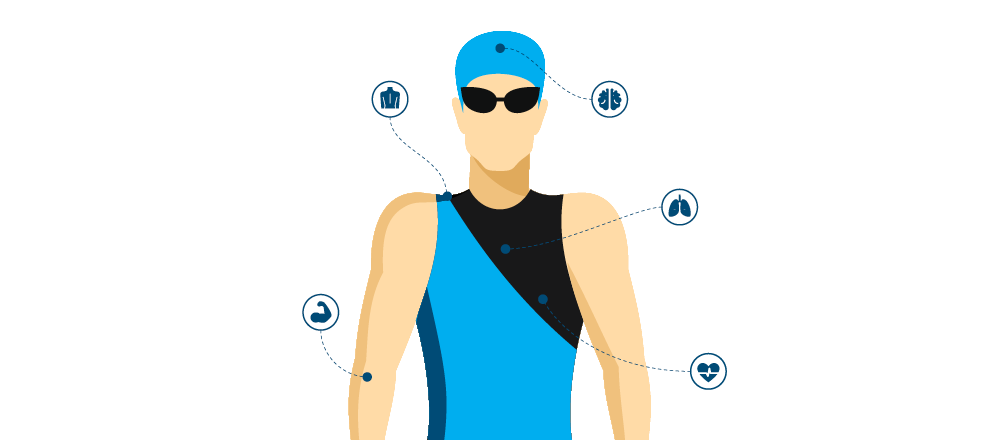
Physical activity in the later years of life is essential to promote a healthy ageing process andindependent functioning. Swimming has been shown to help prevent or manage manychronic diseases, as well as improving overall physiological and psychological health.
Swimming is one of the best activities you can do all year round which benefits your mind and body. No other workout is low impact but achieves high results building muscles, burning calories and stimulating your brain. The great thing about swimming is that it’s for everyone! You don’t need to be the next Ian Thorpe to get involved.
SOURCE OF FITNESS
Whether you’re swimming for recreation or competition, swimming gives you a great work out. It keeps your heart rate up, builds cardio fitness, burns calories, and develops endurance.
BUILD MUSCLE TONE AND STRENGTH
Swimming uses almost all muscles in your body! It’s a resistance exercise that builds muscle and strength for a whole body workout. Swimming helps you develop deep stabilising muscles in your core which are often missed.
LOW IMPACT
When in water, your body automatically becomes lighter so you don’t have pressure on your joints like other activities such as running. Swimming is an ideal activity to work stiff muscles and sore joints, stretching and strengthening your body.
BOOSTS YOUR MOOD
Exercise releases chemicals into your body called endorphins. These trigger a positive feeling into your body which boost your mood. Swimming has been shown to alleviate stress and tension.1 Swimming is also a meditative exercise, the repetition, movement and breathing can help you to relax and block out other distractions.
GOOD FOR YOUR BRAIN
Swimming has found to increase blood flow to the brain, which leads to more oxygen. That means you’ll experience more alertness, better memory and cognitive function.2
HELPS CHILDREN REACH MILESTONES EARLIER
Children who learn to swim at a young age have been shown to reach many developmental milestones earlier than the normal population. As well as achieving physical milestones faster, children can also improve their visual-motor skills, and mathematical related tasks by swimming.3
SWIMMING IS GREAT FOR ALL AGES AND ABILITIES
From toddlers to geriatrics and everyone in between, swimming is for people of all ages. The ability to control your own pace and intensity means that you can swim at your own capability.
MEET NEW PEOPLE
Whilst swimming is an individual sport, it’s also very social! You can meet people from all walks of life when swimming. Have a chat in the lap pool, join a swimming club, or get involved in aquatic facility social events to get to know people in your community.
As well as all the health benefits listed above, the great thing about swimming is that you can do it rain, hail or shine, regardless of the temperature! Whilst your backyard pool, the river, or beach cool down over winter, most aquatic facilities run heated pools year round so you’ve got no excuse to stop swimming!
Still think swimming isn’t for you? There’s lots of other fun activities you can do in the water such as pool lifesaving sport, aqua aerobics or even walking in the water. Contact your local aquatic facility today!
WHILST SWIMMING IS GREAT FOR YOUR HEALTH, WHERE THERE’S WATER THERE’S A RISK OF DROWNING, SO FOLLOW THESE TIPS TO STAY SAFE WHEN SWIMMING:
- Learn how to swim – It might seem obvious, but if you don’t know how to swim or you’re not a confident swimmer we recommend that you contact your local aquatic centre or swim school to sign up for lessons. You’re never too old or young to learn.
- Get your health checked – If you’re over 55 or have a medical condition we recommend you contact your doctor and have regular check-ups before doing physical activity.
- Warm up and stretch – Make sure you warm up and stretch before physical activity to avoid cramps or injuries.
- Never swim alone – If you’re not swimming at an aquatic facility or somewhere with a lifeguard, we recommend that you swim with someone else in case you get into trouble.
- Follow the rules – Whether you’re at a pool, beach or river, always follow safety signs.
- Stay rehydrated - Have plenty of fluids and drink regularly.
- Keep Watch – Always supervise children when in or around water. Remember that lifeguards aren’t babysitters, you’re responsible for looking after your own child.
Sources
1 B.G.Berger, David Robert Owen, 1983, Mood Alteration with Swimming—Swimmers Really Do “Feel Better”, Research Gate
2 Pugh CJ1, Sprung VS, Ono K, Spence AL, Thijssen DH, Carter HH, Green DJ, 2015, The effect of water immersion during exercise on cerebral blood flow, NCBI
3Deborah Marshall, 2012, Swimming Kids are Smarter, Griffith University
